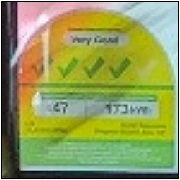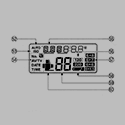|
craig588 posted:2133 is way low and you're leaving performance behind. Once you're up to the 2900MHz level you're basically maxed out in terms of performance. What motherboard is it? Craptacular! posted:What sort of system do you have? Motherboard: Gigabyte GA-AB350M-Gaming 3-CF
|
|
|
|

|
| # ? Apr 26, 2024 15:56 |
|
https://www.gigabyte.com/Motherboard/GA-AB350M-Gaming-3-rev-1x#support-dl Is your BIOS up to date? Inch your speeds towards 3000mhz. Have you tried loading the XMP profile, noting the numbers, and lowering the frequency or CAS latency one or two notches?
|
|
|
|
Sorry, the AMD version of 3000 is 2977, not 2997. Not that you'd notice the difference anyways. Either way, an updated BIOS usually gets ram running at
|
|
|
|
I'd start with 2666MHz for a Ryzen and move to 2933. Then maybe try to move a bit higher if there's more multipliers left between 3200 and the highest you found stable. I would never break 1.35V since you're not pushing the rated memory speed. My memory only does 2133 16-16-16 at 1.2 for some reason, but flipping to the XMP profile does 2666 14-14-14 at 1.35V no problem. So there might be a minimum voltage it needs to "wake up".
|
|
|
|
My DDR4 manages 3000 @ 1.25V on a 8700K, but gives memtest errors at 3200 no matter what without touching VCCSA/IO voltages. These days the weak link is the IMC not the RAM per se.
|
|
|
|
Yea, I got it up to a stable 3000. Thanks for the help! Also, if I wanted to play around with trying to hit 3200, y'all wouldn't recommend me trying to push the voltage past 1.35, as voltage likely isn't the culprit?
|
|
|
|
So I dug my Z87/4770k system out of storage and I want to OC it again. I totally forgot all the details and started watching a bunch of videos and they all say to OC using manual voltage override but when ready to use the system switch to adaptive voltage with the caveat that adaptive voltage will blow up my CPU under synthetic load. Surely there's got to be an additional 'max' setting on adaptive voltage so under synthetic load it will ramp up but only until a user defined upper limit so as to not brick the CPU. Since the VRM is on chip, does that mean such a feature would have to be implemented by Intel and not something a motherboard maker would be able to do even if they wanted?
|
|
|
|
If you just want power states without frying your computer in Prime, there’s always offset. I have an Ivy so I don’t get an Adaptive setting go research, but my understanding is it is supposed to take the hours of stability testing out of the process. Like it’s easy enough for me to find a starter offset, but I am only where I am now after more than a week of both running a lot of benchmarks and THEN also playing Overwatch for hours and looking for WHEA errors every few games. Adaptive is like, “don’t worry about it, we’ll give it enough voltage. Just don’t run any heaters.” If voltage spikes are a concern, run it with LLC off.
|
|
|
|
Shaocaholica posted:So I dug my Z87/4770k system out of storage and I want to OC it again. I totally forgot all the details and started watching a bunch of videos and they all say to OC using manual voltage override but when ready to use the system switch to adaptive voltage with the caveat that adaptive voltage will blow up my CPU under synthetic load. Surely there's got to be an additional 'max' setting on adaptive voltage so under synthetic load it will ramp up but only until a user defined upper limit so as to not brick the CPU. Since the VRM is on chip, does that mean such a feature would have to be implemented by Intel and not something a motherboard maker would be able to do even if they wanted? I recommend increasing the turbo boost multiplier slowly and manually increasing the voltage if you cannot reach your desired performance level.
|
|
|
|
Craptacular! posted:Adaptive is like, “don’t worry about it, we’ll give it enough voltage. Just don’t run any heaters.” That's the scary part because who's gonna remember that months or years later?
|
|
|
|
Shaocaholica posted:That's the scary part because who's gonna remember that months or years later? Well most people reach something they consider stability and then use their computers as they otherwise did previously. If your regular routine involves synthetic benchmarks, maybe you shouldn't use Adaptive. Most motherboards also come with Windows software that will report settings and information to you, though mine is so old because Ivy Bridge Will Never Die that I never got to play around with mine, since Meltdown patches killed it and Asus's response is "ah, well". Update to my own situation: I found out those errors I was getting was simple software instability and not really a dying CPU. Moved offset high enough to my own personal comfort threshold and still got one every three hours of Overwatch, so I finally dropped to 4.3 and moved it back down and there's nothing. I just don't have a chip that OCs very high, I guess.
|
|
|
|
Shaocaholica posted:So I dug my Z87/4770k system out of storage and I want to OC it again. I totally forgot all the details and started watching a bunch of videos and they all say to OC using manual voltage override but when ready to use the system switch to adaptive voltage with the caveat that adaptive voltage will blow up my CPU under synthetic load. Surely there's got to be an additional 'max' setting on adaptive voltage so under synthetic load it will ramp up but only until a user defined upper limit so as to not brick the CPU. Since the VRM is on chip, does that mean such a feature would have to be implemented by Intel and not something a motherboard maker would be able to do even if they wanted? I always used offset mode with HWinfo to see the real max voltages direct from the mobo sensors and never trusted adaptive. Haswell first gen has like the worst OC headroom out of the post-SB chips anyway that even 4.3GHz is going to be a challenge.
|
|
|
|
Pretty much everything post Sandybridge needs to be delidded. Starting with the 4790 it got better, but there's still like 10 degrees to gain by cutting out the glue. People with early Haswells and Ivy Bridges gained like 15-20 degrees.
|
|
|
|
craig588 posted:Pretty much everything post Sandybridge needs to be delidded. That is incorrect, the earliest chips can hit 4.3-4.5 before hitting a wall, and later chips go up to 4.8. You get better performance by delidding, but nobody "needs" to delid unless the "need" 5ghz+.
|
|
|
|
That seems really optimistic. 4.3GHz seems average and 4.7GHz seems good. I've never seen a Haswell running at 4.8GHz long term. My Haswell is soldered and it "only" does 4.7GHz, 4.8GHz is full of errors and only good for screen shots or 10 minutes of benchmarking. 4.4GHz is when they seem to start approaching thermal runaway with people hitting 80C on 4 core models even with a D15 and being delidded.
|
|
|
|
So offset mode is just like it sounds? A constant offset is added to the stock voltage ramp at all points on the ramp? Is there a table? Seems like the way to go is to OC manually and then set: offset = OC manual voltage - standard max voltage If this works the way it does, why does adaptive even exist unless a constant offset doesn't actually work at the low end?
|
|
|
|
Offset is supposed to be a fixed voltage from the stock voltage whatever the stock voltage is, adaptive is supposed to be a dynamic voltage up to the value set when the CPU is under load. LLC can mess with both. I like offset more for earlier processors because it's simpler so there's less to go weird, but at some point adaptive must have gotten better. Offset will give you weird results like making the idle voltage 1 volt since it's fixed for all voltages the processor requests, but at idle you also should be cool and clocked down so much that it shouldn't really matter. There's not really a public table of voltages because most processors are different and they dynamically request voltages based on their assumed stock speeds and the silicon quality.
|
|
|
|
Shaocaholica posted:If this works the way it does, why does adaptive even exist unless a constant offset doesn't actually work at the low end? It takes a lot of time to find a stable offset, if you have certain definitions of stable that involve 12+ hour tests. On top of that you’re raising your idle voltages to achieve stable old performance, and adaptive bridges that gap. However, I (an idiot at OC, admittedly) can’t imagine how adaptive is that much different than offset with Medium tier (25%) load line calibration. Both techniques will shock the CPU with blasts of too much current, but LLC does it briefly every time your chip comes out of turbo, while Adaptive takes the “Prime95 might fry your chip” approach. Both Adaptive and Offset+LLC allow you to have lower idle voltages, though; and since my computer spends most hours of the day with the screen turned off and only Firefox and Discord open, I’d rather deliver lower voltages doing that even if it means every time I quit an FPS the CPU briefly gets a shock. Craptacular! fucked around with this message at 22:36 on Apr 27, 2018 |
|
|
|
I just measured Vcore on the rear of my motherboard out of sheer boredom and found there's quite a bit of voltage drop between what hardware monitoring shows and what arrives at the back of the socket. Probably useless information for most but I'll post it anyway for reference: 8700K 5 GHz Asus Maximus X Hero 1.335V in BIOS, LLC 6 Fluke 115 multimeter 135W load (CPU-Z stress): 1.328V HW Monitoring 1.330V VRM phase cap 1.309V Socket 215W load (Prime AVX 8K): 1.360V HW Monitoring 1.356V VRM phase cap 1.318V Socket e: fixed bios voltage eames fucked around with this message at 22:35 on May 4, 2018 |
|
|
|
One of the reasons I cover my hardware with 30 gauge probe wires. I never trust software monitoring, but it's pretty close for the amount of effort most people will be able to put in. It's one of the reasons I give away my hardware. I've never had a failure but risk scares me so I can just say it was free don't blame me. 30 gauge wires to a .1 inch header which I have labeled externally to all the points I want to test. craig588 fucked around with this message at 22:32 on May 4, 2018 |
|
|
|
If anyone has an X58 system still lying around functional and hasn't tried a Westmere-EP Xeon yet to see if it will work, I would highly recommend it as a fun little project now that LGA1366 processors of all varieties are so cheap. I have a Gigabyte EX58-DS4 that I originally got back in November 2008 with an i7-920 and while I was able to get it to up around 3.8GHz with no trouble originally, 4.0 was tricky to get stable and beyond didn't seem feasible. After I built another system around a 2500K which could hit 4.4 nearly without trying, overclocking on the i7-920 seemed like more of a curiosity than a useful enterprise so I mostly forgot about it for a while. Recently after tinkering with underclocking a Nehalem-EP L5520 to use as a home server, I got curious about my options for upgrading to a hexcore. According to Gigabyte's website, the board only supports Gulftown hexcores and they're still relatively expensive but there are some Westmere-EP quads that work like the E5603. Since the board supports 130W models of Nehalem I knew power delivery should be adequate and it really didn't make much sense that microcode would be present for only some of the Westmere-EP generation, so I decided to buy the cheapest model of hexcore I could just to see and got an L5640. Surprisingly it worked without a hitch and like the L5520, responds very well to undervolting - you can run all day long at 2GHz under 30W. Unfortunately without an unlocked multiplier, I could only take a low-ratio chip like the L5640 so high before hitting a wall. With the knowledge that it worked though, I went back to eBay and got an X5660. The X5660 is going much, much farther than I ever expected to be able to take it:  Considering that the top-model X5690 hits 3.73 under max turbo and I'm only using a Hyper 212 to keep this cool right now (which is why HT is disabled, it's still pushing 175W and close to 90C), I'm wondering if I somehow got a golden chip or if Westmere is the golden generation that never was because they all got released as clock-locked Xeons. I don't think I've had an overclock this good since 12 years ago when I took a Pentium M 1.6 to 2.56 and that at least made a bit more sense being a mobile chip running with desktop cooling. Eletriarnation fucked around with this message at 21:59 on May 6, 2018 |
|
|
|
I think that's a real good chip! I think they tend to average around 4GHz. 4.6GHz is what I got out of a quad core Sandybridge with a D14 and I keep a 6 core Haswell at only 4.3GHz with a D15 to keep it silent. It does 4.7GHz in loud form but if I can hear my computer it's not worth it.
|
|
|
|
Looking at this I'm wondering why Intel wasn't selling a 4GHz Westmere as the i7-1990X or whatever - I mean, this chip came out in Q1 '10 a full year before Sandy Bridge and almost two before Sandy Bridge E. Even the 3960X was also a 6-core running at only 3.9 stock and it was over a grand at release. I guess it probably just comes down to a lack of demand - four cores still seemed like a lot at that point. Eletriarnation fucked around with this message at 20:54 on May 6, 2018 |
|
|
|
Eletriarnation posted:If anyone has an X58 system still lying around functional and hasn't tried a Westmere-EP Xeon yet to see if it will work, I would highly recommend it as a fun little project now that LGA1366 processors of all varieties are so cheap. You done good. I have an EX58-DS3 with an X5670 in it & Hyper 212, and I can only get an all-core 3.8ghz out of it if I want 100% stability. I think I only have $200 into it(I already had the memory) and it makes a helluva Hackintosh.
|
|
|
|
That was still the era where Intel thought they needed to be competitive with AMD. The highest end 6 core Westmere-EP Xeon was a 1,700 dollar processor when new. They're cheap now because they're 8 years old. It's pretty crazy that you're not missing out performance wise with an 8 year old processor through. X58 is missing a lot of newer features, but if you don't need those either you're really not missing out on much.
|
|
|
|
Yeah, it helps that the system I'm coming from is only a generation newer; the only feature that I really care about losing from my Z68 motherboard is USB 3.0 and that's from an ASMedia chip instead of the chipset anyway so I'll just add it back in with a card. I was already limited to PCIe 2.0 which I doubt makes much difference gaming on a 1060 and while I'll have to run RAM at 1600MHz instead of 2133 I expect triple channel to compensate for that.JnnyThndrs posted:You done good. I have an EX58-DS3 with an X5670 in it & Hyper 212, and I can only get an all-core 3.8ghz out of it if I want 100% stability. I think I only have $200 into it(I already had the memory) and it makes a helluva Hackintosh. I actually used this one as a Hackintosh for a while too before deciding that I didn't actually have a purpose for a Mac at home. RAM cost vs. a new DDR4 system is a huge appeal for me, since a while back I was able to get 6x4GB of 2012 Mac Pro RAM for ~$100 off eBay. It has like 10 valid SPD timings all at 1.5V from 666MHz 5-5-5-12 up to 1866MHz 13-13-13-32 which is a great help when doing BCLK overclocking, it doesn't have crazy huge heatspreaders that get in the way of my CPU fans, and it's even ECC which doesn't matter for this system but is nice for the batch that I'm using in a C226-chipset home server. Eletriarnation fucked around with this message at 22:06 on May 6, 2018 |
|
|
|
Eletriarnation posted:If anyone has an X58 system still lying around functional and hasn't tried a Westmere-EP Xeon yet to see if it will work, I would highly recommend it as a fun little project now that LGA1366 processors of all varieties are so cheap. Woah! I've got an i7-740 and an X-58. You're telling me I can drop a x5660 in there without swapping out anything else?! AARP LARPer fucked around with this message at 20:58 on May 7, 2018 |
|
|
|
Make sure your bios has microcode for 6 cores, but maybe. At worst you'll be out like 40 dollars, Xeons tend to work and the support list just never gets updated. I think that's a really good processor too, I'd expect around 4GHz from a 6 core Westmere, but obviously better is possible.
craig588 fucked around with this message at 21:28 on May 7, 2018 |
|
|
|
Dadbod Apocalypse posted:Woah! I've got an i7-740 and an X-58. You're telling me I can drop a x5660 in there without swapping out anything else?! Maybe, it depends totally on the motherboard and BIOS revision - also I assume you mean i7-940, as 740 would be P55/LGA1156. You can look into how to dump microcode from a BIOS and read its contents, then compare the IDs you get to the one for Westmere for an added measure of confidence. I was actually able to boot the L5640 but not the X5660 with my first attempt using the F11 version which was the final full release for my board - I still don't really get that but the final F12o version which is still marked as a beta works fine for both.
|
|
|
|
If you're stuck with 1156 you can get a X3470 for like 30 dollars. Only 4 cores, but should overclock well. The X3480 is 133MHz faster stock but the ones I found were all 100+ dollars probably due to it being the highest end 1156 processor. Edit: Or just overclock the 750, there's very little difference between 1156 models. I thought the Xeon would be cooler or have more cache or something, but nope it's basically the same except for more clock speeds and Hyperthreading. craig588 fucked around with this message at 01:38 on May 8, 2018 |
|
|
|
I would love to tinker with X58 and Westmeres but the boards are always so goddamned expensive since launch till today versus new alternatives. Is $140 for a i7-930 + Asus X58 Sabretooth a good deal? craig588 posted:If you're stuck with 1156 you can get a X3470 for like 30 dollars. Only 4 cores, but should overclock well. The X3480 is 133MHz faster stock but the ones I found were all 100+ dollars probably due to it being the highest end 1156 processor. 760 is generally much better binned than 750 but S1156 is so meeeeeeh for being stuck at 4 cores Palladium fucked around with this message at 02:49 on May 8, 2018 |
|
|
|
Not really because any 1366 quad is virtually worthless at this point - good hexcores are worth a little but all the value is in the mobo. You can pay for it if you want to tinker but I can't pretend it's a superior approach for getting a hexcore vs a new Ryzen system - it might be cheaper, but with as much age as all X58 boards have you're definitely taking a chance. e: for anyone who has 1156, get an X3440 if you can OC because it's the cheapest model with HT. I use one of those in my work desktop with a 25% OC, works great. Seemed to be OK up to around 4.0 but for a work machine I didn't care about pushing it to the edge. Eletriarnation fucked around with this message at 03:05 on May 8, 2018 |
|
|
|
Eletriarnation posted:Not really because any 1366 quad is virtually worthless at this point - good hexcores are worth a little but all the value is in the mobo. You can pay for it if you want to tinker but I can't pretend it's a superior approach for getting a hexcore vs a new Ryzen system - it might be cheaper, but with as much age as all X58 boards have you're definitely taking a chance. That what's I'm talking about, but I also like holding a piece of computing history. Nobody really wants the S1156 Xeons since almost everyone who bought into the platform new would also have at least a i5-750. I'll think I would just stick to tinkering my $20 Xeon E5450 and upcoming $0 X38 mobo.
|
|
|
|
Eletriarnation posted:Maybe, it depends totally on the motherboard and BIOS revision - also I assume you mean i7-940, as 740 would be P55/LGA1156. You can look into how to dump microcode from a BIOS and read its contents, then compare the IDs you get to the one for Westmere for an added measure of confidence. I was actually able to boot the L5640 but not the X5660 with my first attempt using the F11 version which was the final full release for my board - I still don't really get that but the final F12o version which is still marked as a beta works fine for both. Sorry -- typo. Yeah, I've got an i7-940 on an EVGA x58 board. For ~$30, it's worth a shot. Thanks for posting your experience with this!
|
|
|
|
Oh, if you have EVGA you're almost certainly good - you should check for yourself to be sure but from what I recall they actually advertise Westmere support for their X58 boards instead of (maybe) shoving in the microcode and saying nothing about it like the other consumer board OEMs.Palladium posted:That what's I'm talking about, but I also like holding a piece of computing history. Yeah, in my case I found a decommissioned server in the junk bin at my work that was using an Intel P55 board with an i3-530. Actually I was able to get the i3 up to around 4.4 so it would have been an upgrade over the i3-5010U NUC that I was using regardless, but much more so with a quad running at ~3.5 instead. At this point buying an X58 system intending to overclock Westmere is not really that compelling just for games in my opinion, because if like people are saying a more typical OC is around 3.8-4.0 then you're going to end up with something that has lower IPC and clocks than a Ryzen 5 2600X and uses twice the power. Obviously an 8700K is going to be better in every way too. The main reason it excited me was that I'm coming from Sandy Bridge and already have the X58 system, so if my guess that IPC is similar holds then with a crazy 4.6 chip I basically get to double my L3 cache and add two cores for the cost of the NH-D14 I'm buying to keep it cool at that speed. But as was mentioned earlier, the one big edge that remains is the cost of DDR3 vs. DDR4; especially if you're going past 16GB and if you already have ancillary parts like storage/PSU/case, your up-front cost will be much higher with a new system. For that reason I think the platform still has some appeal for building a powerful but relatively cheap workstation - you can find Supermicro boards including dual-socket models for pretty cheap at this point and 6/12/18x16GB registered ECC DDR3 isn't that bad either if you're willing to buy used. Nothing to do with overclocking at that point though, unless Supermicro's server boards are really wandering off the beaten path in their feature set. Eletriarnation fucked around with this message at 17:01 on May 8, 2018 |
|
|
|
Eletriarnation posted:Oh, if you have EVGA you're almost certainly good - you should check for yourself to be sure but from what I recall they actually advertise Westmere support for their X58 boards instead of (maybe) shoving in the microcode and saying nothing about it like the other consumer board OEMs. Cool. I can use my regular old non-registered RAM I hope?
|
|
|
|
Definitely, I doubt registered RAM would work in an X58 board actually - you'd need one of the server boards for that. You can use ECC if you want, it just won't run in ECC mode unless you have a Xeon and the motherboard has traces/BIOS support for it. My Gigabyte board doesn't.
|
|
|
|
Cool. Thanks again. I bought an x5660 for $30 off ebay and it'll be here in a few days. What's a good benchmark app to use to measure general performance before and after?
|
|
|
|
Anyone wanna recommend something else than Silent Wings 3 for silent airflow (air-only) cooling before I pull the trigger? Also, is there anything I should know about Zen(+) and XMP-tuning my RAM? I assume turning on XMP in BIOS after setting things up is the default way to do it. ufarn fucked around with this message at 16:15 on May 8, 2018 |
|
|
|

|
| # ? Apr 26, 2024 15:56 |
|
Dadbod Apocalypse posted:Cool. Thanks again. I bought an x5660 for $30 off ebay and it'll be here in a few days. Cinebench R15. 4GHz on all cores should net you a MT score ~900, slightly better than a stock 4790K.
|
|
|















